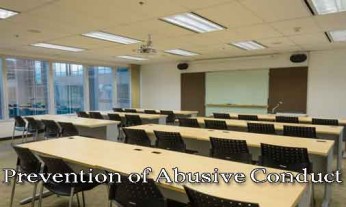 Assembly Bill (AB) No. 2053, “prevention of abusive conduct”, signed into law by California Governor Jerry Brown has added new requirements for employers regarding their harassment policies. AB 2053 amended Section 12950.1 of the California Government Code, which lays out necessary elements in the employee training programs that are required for employers with more than 50 employees. As a result of the new bill, these employers will be required to include training for supervisors on “prevention of abusive conduct.”
Assembly Bill (AB) No. 2053, “prevention of abusive conduct”, signed into law by California Governor Jerry Brown has added new requirements for employers regarding their harassment policies. AB 2053 amended Section 12950.1 of the California Government Code, which lays out necessary elements in the employee training programs that are required for employers with more than 50 employees. As a result of the new bill, these employers will be required to include training for supervisors on “prevention of abusive conduct.”
What Does “Abusive Conduct” Mean?
AB 2053 contains a definition of abusive conduct. It reads:
“For purposes of this section, ‘abusive conduct’ means conduct of an employer or employee in the workplace, with malice, that a reasonable person would find hostile, offensive, and unrelated to an employer’s legitimate business interests. Abusive conduct may include repeated infliction of verbal abuse, such as the use of derogatory remarks, insults and epithets, verbal or physical conduct that a reasonable person would find threatening, intimidating, or humiliating, or the gratuitous sabotage or undermining of a person’s work performance. A single act shall not constitute abusive conduct, unless especially severe and egregious.”
While the law requires employers with more than 50 employees to provide training to avoid abusive conduct, it does not actually ban abusive conduct in the workplace. This is to say, it does not create a cause of action for employees who have been subjected to abusive workplace conduct. (However, many forms of abusive conduct were already illegal under other statutes, such as sexual harassment laws.)
Other Requirements of Section 12950.1, Prevention of Abusive Conduct
Under the previously existing requirements of Section 12950.1, California employers with more than 50 employees must provide their supervisory employees with at least two hours of “classroom or other effective interactive training and education regarding sexual harassment.” The training must occur within 6 months of when the employees assume their supervisory positions.
The training must be offered to supervisory employees at least once every two years, and it must include “practical examples aimed at instructing supervisors in the prevention of harassment, discrimination and retaliation.” It must also be presented by trainers or educators with knowledge and expertise in the prevention of harassment, discrimination and retaliation.
12950.1 contains language making it clear that if any particular individual at a workplace does not receive the training, that will not in and of itself cause their employer to become vulnerable to an action alleging sexual harassment. It also states, however, that simply providing the training will not insulate an employer from liability in an action alleging sexual harassment.
(In other words, a sexual harassment suit will not be automatically successful just because a supervisor wasn’t given the proper training. But at the same time, an employer cannot claim that a supervisor cannot be guilty of sexual harassment just because he or she received the training.)
Advice on Meeting the Requirements of 12950.1
AB 2053 went into effect on January 1, 2015 – so if you are a California employer with more than 50 employees, and you have not yet updated the trainings that are given to your supervisors, it’s time to make some changes. If you have any questions about how to comply with the requirements of the new legislation, you can call or email the employment and labor law attorneys at Beck Law P.C., in Santa Rosa Labor Lawyer, to schedule a consultation.
